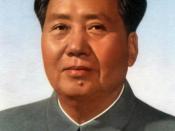Its a fact! Very very good!
The Question of Equality
Equality is the fundamental demand of the rebellion of the poor: it should be the ideological force behind the new society. How this egalitarian demand is understood is crucial to the distinction between the Democratic Revolution and the Marxist-Jacobin Revolution.
The Marxist answer to the egalitarian demand is the dictatorship of the proletariat, which Maurice Duverger shrewdly describes as an accurate continuation of the Jacobin theory of terror:
'. . .Man is born but capitalism corrupts him: In order to destroy the system of oppression, exploitation and alienation development by capitalism, violence must be used. Violence against the state, in the first palace, so long as it is in the hands of the exploiting classes: This means revolution. Next, when the working class has taken power, the force of the state is directed against the exploiters and used to destroy every trace of exploitation: this stage is the dictatorship of the proletariat.'
In a society such as ours, in which the rich are too few and the poor too many, the Marxist-Jacobinist approach has a ringing appeal. With the term proletariat, one simply substitutes the poor. By 'expropriating the expropriators,' or eradicating the rich, equality is achieved with one bold stroke.
The trouble with this formulation, however, is that the dictator-proletariat is itself dictated upon by an all-powerful Party, while even among the poor there is a hierarchy of classes, beginning with the 'advanced' proletariat, followed by the peasantry, the intellectuals and the petite bourgeoise. Moreover, there is a contemptible class, the lumpenproletariat, a term reserved for 'the scum of the earth.'
Stated, therefore, in Marxist-Jacobinist terms, the rebellion of the poor is self-contradictory: it is unable to approximate the egalitarian idea.
The reason for this lies in the...


